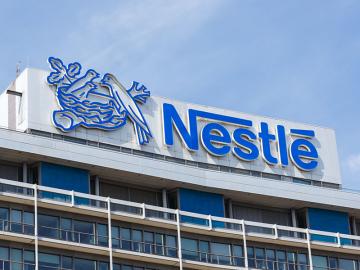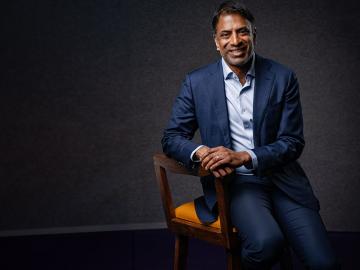
PNC Menon: A businessman by choice, billionaire by chance
Four decades ago, PNC Menon dropped out of college and headed to Muscat with Rs 50 in his pocket. Today, he helms a multi-billion-dollar real estate empire that extends from Saudi Arabia to India. He is now on the cusp of diversifying into newer businesses and starting a real estate fund
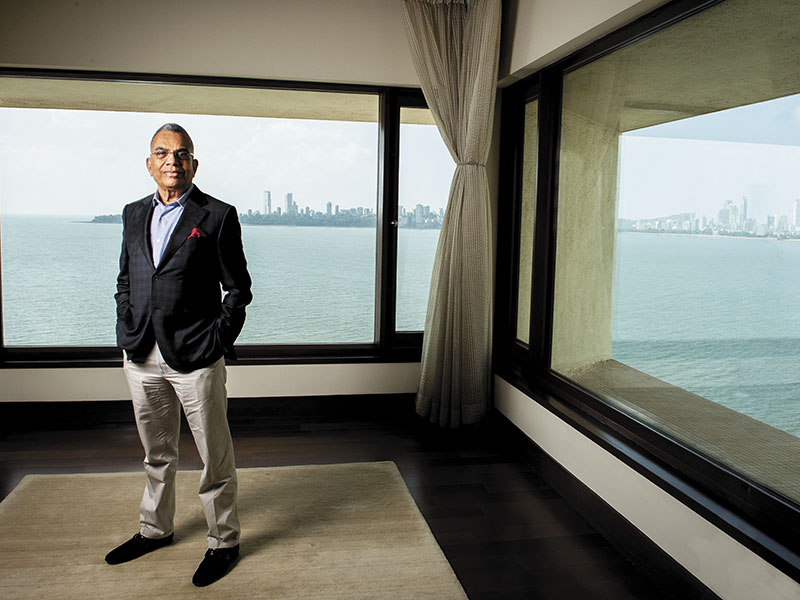
Image: Vikas Khot
Seated on a plush sofa in suite number 1663 at The Oberoi, Mumbai—his favourite suite which provides a sweeping view of the Arabian Sea—Puthan Naduvakkatt Chenthamaraksha (PNC) Menon proclaims: “I will retire only in two ways—one is if I’m not alive, and, second, if I’m not able to move.”
The 68-year-old, self-admittedly, is addicted to success. “If you’re successful, you want to succeed more and more. It’s an endless journey. It’s an addiction which I’m enjoying,” says the NRI billionaire (Forbes estimates his personal net worth at $1.64 billion).
This addiction has taken him places, both in terms of geography and business. The founder and chairman of Sobha Group, a construction and real estate player in the UAE, and chairman emeritus of India-listed real estate developer Sobha Limited, is diversifying into newer sectors: Hospitality, with the launch of his own hotel brand Strada; branded furniture and lighting, for which he is setting up a factory in Abu Dhabi; real estate consultancy services; and a multi-billion dollar real estate fund, Menon Capital, which would invest in rent-yielding commercial assets across Europe, the UAE and India.
For the last one, Menon intends to draw on his decades-long experience. “I have been in the building industry for 47 years. I thought it is time for me to leverage the knowledge that I have got over this period to launch a fund which would drive investments into real estate,” says Menon. “We are ready and should be getting into the market any time now.”
Menon’s privately-held Sobha Group, which is headquartered in Dubai, currently has three real estate projects in various stages of development in the UAE, which together would deliver revenues in excess of $10 billion over the next 10 years. His construction work in the region includes the Dubai Marina Yacht Club and the Kempinski Hotel Mall of the Emirates in Dubai and the Sultan Qaboos Grand Mosque in Muscat.
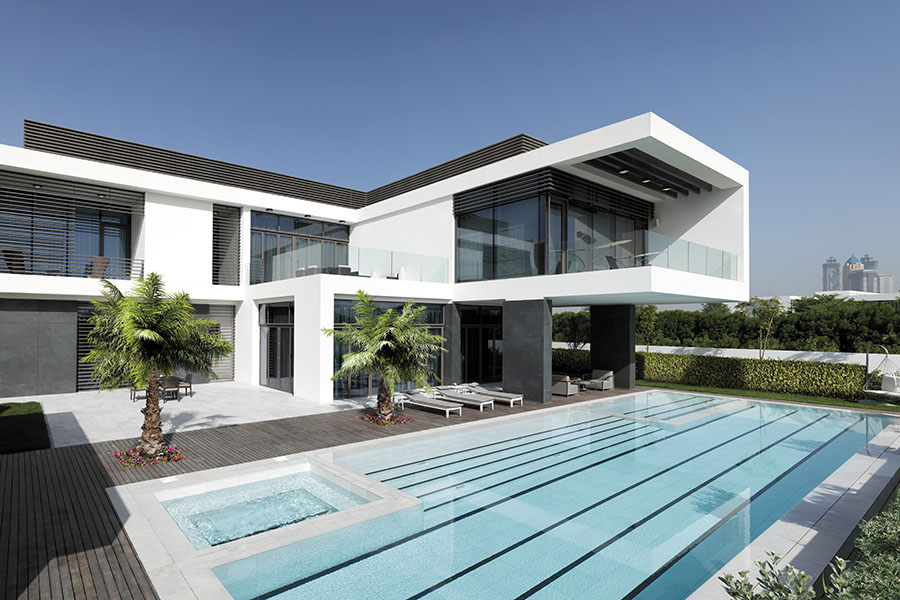
Image:
Menon’s real estate play in the UAE is a fairly recent development (it started in 2011) compared to his construction business, which has been going on since the mid-’90s. Among the premier properties being developed of late is the $10 billion Mohammed bin Rashid Al Maktoum City-District One project in Dubai, which is an ultra-luxury residential joint venture between the Meydan Group, backed by Sheikh Mohammed bin Rashid Al Maktoum, the ruler of Dubai, and the Sobha Group. The project consists of villas and mansions that sport price tags of $4 million and $20 million, respectively.
In April last year, Sobha Group partnered with the government of Umm Al Quwain in the UAE to develop a $6.8 billion real estate project, Firdous Sobha, located on an island off the emirate’s coast. Besides these, the company is also involved in an upcoming real estate project (of over 1,200 acres) in Riyadh, Saudi Arabia.
That should be enough for most people. Not for Menon, who is spearheading 55 million square feet of real estate development in the UAE. Says JC Sharma, vice chairman and managing director of Sobha Limited, Menon’s listed India entity, “Menon has this extraordinary capability of being able to create an organisation and set high standards. And he enjoys doing that morning to evening as he has no other hobbies.”
To get a better sense of how far he’s come, look at where he started. “He went as an ordinary person to the Gulf and has since established himself as more than just a successful entrepreneur,” says Bengaluru-based Shriram Properties’ managing director, M Murali. Irfan Razack, chairman and managing director of the Prestige Group, who heads the flagship Prestige Estates Projects, believes that “passion” and “pride” have taken Menon to where he is now. Because none of what he has achieved so far has been handed to him on a platter, nor did he set out to become a billionaire. As Menon puts it, “It’s not that you plan to become a billionaire. A first-generation entrepreneur turned billionaire is nothing but an accident. If somebody claims to know that they would become a billionaire, sorry, I don’t believe that.”
The Start of a Journey
Born and brought up in Kerala’s Palakkad district, Menon was in the second year of his bachelor’s programme in commerce when he had a chance meeting with Brigadier General (Retired) Sulaiman Al Adawi, then a captain in the army of the Sultanate of Oman, at a hotel lobby in Kochi. Al Adawi, who was looking to buy a fishing boat, struck up a conversation with Menon and soon they began to discuss work opportunities in Oman. Like many of his fellow Keralites working in the Gulf, Menon, too, was taken in by the prospect. (According to Menon, close to 60 percent of Indian migrants there are from Kerala.)
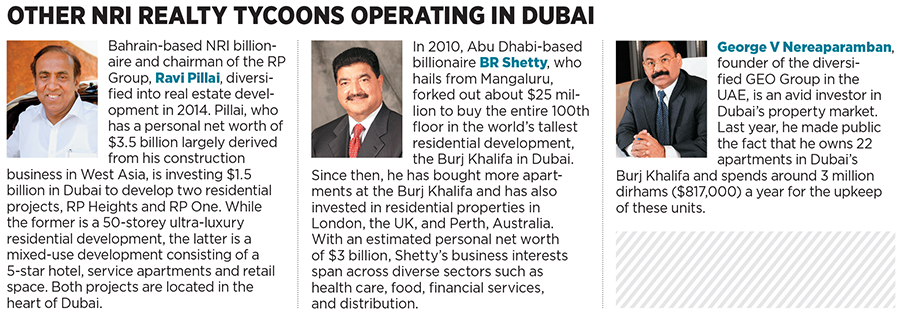
He was undeterred, though. Menon, who claims a long-time passion for interior designs, somehow (the details of this fortuitous transition are a little foggy) found himself in business with Al Adawi, co-founding in early 1977 a furniture, interior, and fit-outs firm in Muscat (now known as S&T Interiors and Contracting) with a loan of 3,000 Omani riyals (equivalent to Rs 75,000 then). At that time, the seaside city was seeing frenzied industrial development due to the petrodollars that were pouring in since the late-’60s, and Menon and Al Adawi were riding on the back of a new rich class. They were designing the interiors of homes for the rich, and even undertook work at the palaces of the Sultans of Oman and Brunei.
At present, Menon holds only 10 percent of the company. “I used to own 50 percent but I transferred 40 percent of the shareholding back to him (Al Adawi) for free. He didn’t allow me to transfer the remaining 10 percent, hence on paper I still have that stake,” says Menon. But even though this business was gaining traction in the Gulf region, Menon had his eyes on India.
In 1995, he set up the real estate company Sobha Developers Limited (now Sobha Limited) in Bengaluru; it was listed on the domestic bourses in 2006. Named after Menon’s wife Sobha, the firm has developed 84.96 million square feet of real estate space, largely in south India.
Menon would go on to use the Sobha brand, from 1995 onwards, to expand his business interests in the UAE. “If you’re scared of your wife, you put her name,” he quips. On a serious note, he adds, his wife has a “beautiful Indian name”—Sobha in Sanskrit means brilliant, illustrious— which is why he decided to use it to brand his business.
It’s been over five years since he handed the chairmanship of Sobha Limited to his son Ravi PNC Menon and entrusted the vice chairman’s post to Sharma. “We read of promoters who are still clinging to what they have established, but he is a man who left [running] the company to his son and me and has never interfered since,” says Sharma. That said, Menon does keep a tab on the Indian real estate market. He believes that there is a huge housing demand opportunity to be catered to due to the growing population and a lack of high quality housing.
Farook Mahmood, chairman and managing director of Silverline Group, a leading real estate brokerage firm in Bengaluru, remembers the time when, 20 years ago, Menon drove him to one of Sobha Limited’s first residential projects in the city. What struck Mahmood was Menon’s eye for detail—be it the bathroom fittings or the car park. “He is among the few builders who are obsessed with quality and finish. And that has paid off,” says Mahmood.
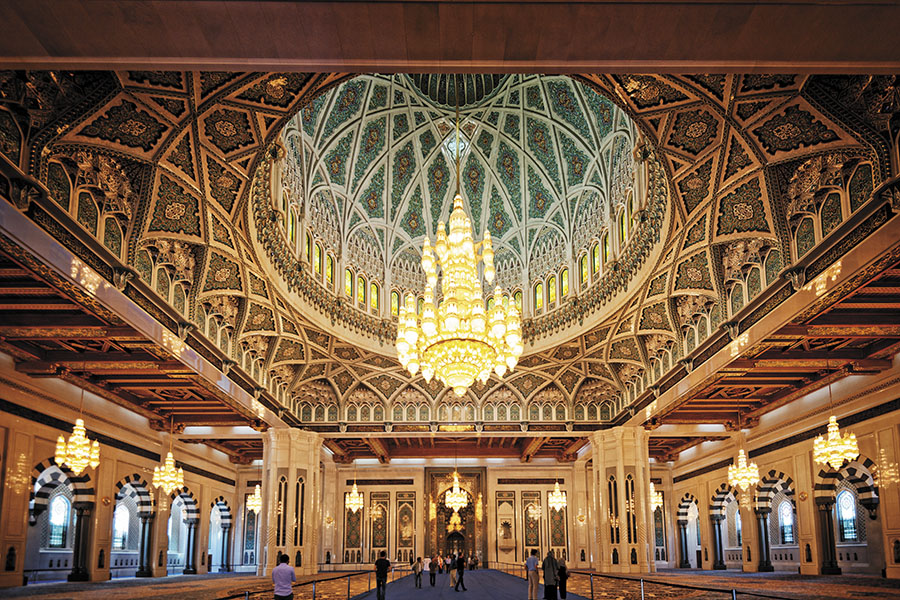
Image: Emad Aljumah / Getty Images
Recently, Mahmood was in Dubai and got a chance to visit Menon’s flagship 8-million square feet under-construction mixed-use project, Sobha Hartland, located just three kilometres from the Burj Khalifa hotel. “It’s a testimony of the work that he has done and that he is really a man of quality. Otherwise, on an international platform, you will not be able to survive,” says Mahmood.
Adds Vinod Menon, founder and CEO of real estate firm Citrus Ventures, “PNC Menon has set a benchmark for quality.” He even compares Sobha’s quality to a German-made car. “You know exactly what you are getting and there are no compromises.”
About 14 years ago, Menon moved base from Muscat when his youngest daughter Revathi got into an American university in Dubai. This was meant to be a temporary shift until her graduation, but he stayed on and built himself a lavish home in Dubai. However, he never forgets from where his journey began. “Oman gave me a spine,” says Menon, who has an Omani passport, adding that close to 10 percent of his personal wealth is being ploughed back into the country for philanthropic activities.
In India, a large portion of his personal wealth is spent on providing free education to over 1,000 girls from below-poverty-line families in his home district, Palakkad. His vision is to educate 12,500 girls per year by opening more schools and universities under his Sobha Academy brand of philanthropic educational centres across India. He also runs a clinic and an old-age home in Palakkad.
Faith in Work
Menon is a man of faith. In addition to wearing a thin gold chain that bears a few pendants of Hindu gods, he also carries a rosary in his pocket. Apart from the divine, his work is worship too. Even on weekends (in Dubai, that means Friday and Saturday), Menon is itching to get to office. “I try to travel on a Thursday evening, so that on Friday I’m in a country that’s working,” he smiles. These are high levels of motivation and manifest in his diversification into newer businesses, all of which would come under PNC Investments, the holding entity of Menon’s ventures outside India.
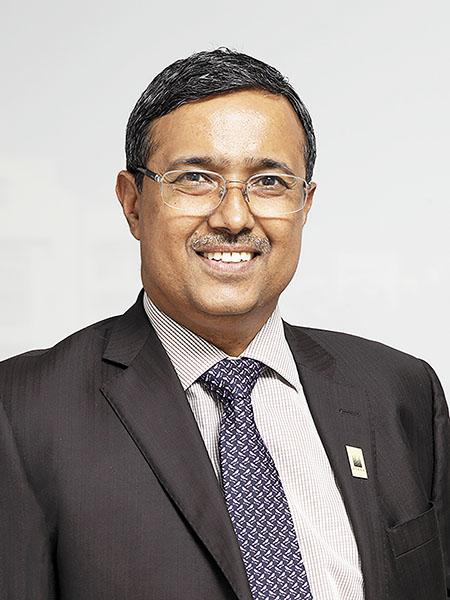
J C Sharma
On the anvil is Menon Capital, a real estate fund that will be launched sometime this year. Menon plans to personally invest about 10 percent of the initial fund corpus of about $500 million, while looking at sovereign wealth funds as primary investors. “My target is to make it a $10 billion fund over a period of ten years,” he says.
Then, there is the planned rollout of a hospitality chain. Sobha Hartland has three hospitality projects, one of which would be a Strada hotel. Besides, he owns a prized land parcel along Dubai’s Sheikh Zayed Road, which is also being planned as a Strada hotel-cum-corporate office for the group. Dubai’s hospitality market has seen a sharp spike in the demand for hotel rooms over the last three to four years. “Hotels in Dubai enjoyed an average room occupancy of 80 percent last year,” says Menon. “And by 2020 estimates are that the number of tourists visiting Dubai would increase by 40 percent.” But some industry insiders in India are sceptical of Menon’s move into the hospitality space. “It will not be easy to take on players like a Marriott, who have such strong loyalty programmes,” says a property consultant.
Menon also has plans for a real estate consultancy company under the name Latinem, which will provide advisory, valuation, broking, and transaction services.
Meanwhile, Menon has had second thoughts about his plans to expand the real estate business to Indonesia, the Philippines and Thailand. “Frankly, I don’t want to go to a country where you have to pay money [alluding to corruption]. We don’t pay any money in Dubai. It’s a very clean country and we have enough opportunities to do business here,” he says.
Then, of course, there is the business of interior designing. Safnon, Menon’s branded furniture and lighting business, resonates with what he had started out with in Muscat four decades ago. In Kizad, Abu Dhabi, Menon is setting up a furniture factory at about 450 million dirham (approximately $123 million). The factory, which will be operational by next year, will supply to retailers across the world. As of now, Menon is betting on the business-to-business (B2B) play, but he has plans of getting into business-to-consumer retail as well. (Menon has a furniture factory in India, which caters to the needs of Sobha Limited’s real estate customers.)
With great diversification and multiple businesses come the addition responsibility of ensuring smooth succession. For that, Menon has a plan in place.
His three children—Bindu (37), Ravi (35), and Revathi (31)—are being given new business verticals to grow on their own. “Bindu is in education, Revathi will head the health care forays and Ravi will lead the other retail furniture businesses being planned, besides looking after the India operations,” he says.
Perhaps the words of Dinesh Shah, a close friend of Menon who hails from the once well-known family-run construction company Shah Constructions (which built some of Mumbai’s iconic buildings such as the Air India building and Express Towers), sum up the builder’s achievements. “I don’t know anything comparable [to Menon’s success],” says Shah. “I come from a construction background and I couldn’t do what he has done. And to think that he doesn’t even have a construction background... I haven’t seen anything like this.”
(This story appears in the 14 April, 2017 issue of Forbes India. To visit our Archives, click here.)
Post Your Comment


